exchange
-
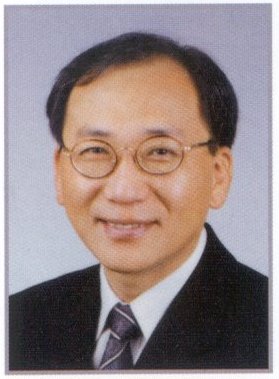 World Micromachine Summit to Open in Daejeon
The 2008 World Micromachine Summit will be held at Hotel Riviera in Daejeon for a four-day run from April 30, drawing worldwide industrial and academic leaders in the micro-nano-technology (MNT).
Organizers say that 76 delegates and 56 observers from 19 countries and regions will take part in this year"s Micromachine Summit. Prof. Cho Young-ho of the Department of Bio & Brain Engineering of KAIST will play host to the annual event.
Participants will discuss the progress of micro-nano-technology in each country and region development of national policies in this area. The Summit was first organized in 1995 by the Micromachine Center of Japan with representatives from 10 countries participating. They were Australia, Canada, Germany, Italy, Japan, the Netherlands, Switzerland, the United Kingdom, and the United States.
Korea was first invited to the conference in 1999. Since then, Korea has played an active role in promoting technological exchanges among nations and has conducted presentations and discussions on major technological breakthroughs.
During the four-day run, each delegation will outline their country"s policies and strategies and present local features on focused areas including this year"s main theme, "Micromachine towards Technology Convergence Era."
The gathering will offer a valuable opportunity for the participants to exchange and collect information on the current state of the MNT, as well as providing a forum for worldwide networking of leaders in the area.
2008.04.29 View 14386
World Micromachine Summit to Open in Daejeon
The 2008 World Micromachine Summit will be held at Hotel Riviera in Daejeon for a four-day run from April 30, drawing worldwide industrial and academic leaders in the micro-nano-technology (MNT).
Organizers say that 76 delegates and 56 observers from 19 countries and regions will take part in this year"s Micromachine Summit. Prof. Cho Young-ho of the Department of Bio & Brain Engineering of KAIST will play host to the annual event.
Participants will discuss the progress of micro-nano-technology in each country and region development of national policies in this area. The Summit was first organized in 1995 by the Micromachine Center of Japan with representatives from 10 countries participating. They were Australia, Canada, Germany, Italy, Japan, the Netherlands, Switzerland, the United Kingdom, and the United States.
Korea was first invited to the conference in 1999. Since then, Korea has played an active role in promoting technological exchanges among nations and has conducted presentations and discussions on major technological breakthroughs.
During the four-day run, each delegation will outline their country"s policies and strategies and present local features on focused areas including this year"s main theme, "Micromachine towards Technology Convergence Era."
The gathering will offer a valuable opportunity for the participants to exchange and collect information on the current state of the MNT, as well as providing a forum for worldwide networking of leaders in the area.
2008.04.29 View 14386 -
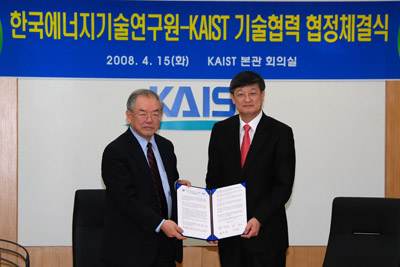 KAIST Inks Agreement with KERI for EEWS Technological Cooperation
KAIST concluded an agreement with the Korea Institute of Energy Research for technological cooperation in the research on the four global issues of energy, environment, water and sustainability (EEWS) on Tuesday (April 15).
The agreement was signed by KAIST President Nam-Pyo Suh and Moon-Hee Han, director of the Korea Institute of Energy Research at the KAIST.
The agreement calls for building a cooperative network for exchanges of personnel and information, and joint use of research facilities and equipment between the two institutions. Under the agreement, KAIST and KIER will also jointly conduct scientific researches.
When it comes to personnel exchange, KAIST will appoint researchers of KIER as adjunct professors of KAIST, while KIER will appoint KAIST professors as its adjunct researchers. Undergraduate students of KAIST will be given an opportunity to join government-commissioned projects and participate in an internship program of the institute.
2008.04.16 View 17723
KAIST Inks Agreement with KERI for EEWS Technological Cooperation
KAIST concluded an agreement with the Korea Institute of Energy Research for technological cooperation in the research on the four global issues of energy, environment, water and sustainability (EEWS) on Tuesday (April 15).
The agreement was signed by KAIST President Nam-Pyo Suh and Moon-Hee Han, director of the Korea Institute of Energy Research at the KAIST.
The agreement calls for building a cooperative network for exchanges of personnel and information, and joint use of research facilities and equipment between the two institutions. Under the agreement, KAIST and KIER will also jointly conduct scientific researches.
When it comes to personnel exchange, KAIST will appoint researchers of KIER as adjunct professors of KAIST, while KIER will appoint KAIST professors as its adjunct researchers. Undergraduate students of KAIST will be given an opportunity to join government-commissioned projects and participate in an internship program of the institute.
2008.04.16 View 17723 -
 KAIST, K-Water Sign MOU for Cooperation in EEWS
KAIST has signed a memorandum of understanding with the Korea Water Resources Corporation (K-Water), a state-invested organization responsible for the development and management of inland water resources, for cooperation in the research on the four global issues of energy, environment, water and sustainability (EEWS).
The MOU was signed by KAIST President Suh Nam-Pyo and K-Water President Kwak Kyul-ho on Feb. 22 at the KAIST.
KAIST and K-Water agreed to establish a cooperative network for exchanges of personnel and research resources for advanced R&D on EEWS. The agreement has been reached on the common belief that EEWS is the most imminent problem facing the humanity in the 21st century.
Under the MOU, KAIST and K-Water will work together to build a EEWS global network; to develop policies and conduct researches to strengthen the competitiveness of Korea"s water industry; and to train and exchange research manpower of the two institutions. The agreement also calls for sharing technological information, exchanging research results and publications; and jointly hosting symposiums and workshops.
2008.03.09 View 15912
KAIST, K-Water Sign MOU for Cooperation in EEWS
KAIST has signed a memorandum of understanding with the Korea Water Resources Corporation (K-Water), a state-invested organization responsible for the development and management of inland water resources, for cooperation in the research on the four global issues of energy, environment, water and sustainability (EEWS).
The MOU was signed by KAIST President Suh Nam-Pyo and K-Water President Kwak Kyul-ho on Feb. 22 at the KAIST.
KAIST and K-Water agreed to establish a cooperative network for exchanges of personnel and research resources for advanced R&D on EEWS. The agreement has been reached on the common belief that EEWS is the most imminent problem facing the humanity in the 21st century.
Under the MOU, KAIST and K-Water will work together to build a EEWS global network; to develop policies and conduct researches to strengthen the competitiveness of Korea"s water industry; and to train and exchange research manpower of the two institutions. The agreement also calls for sharing technological information, exchanging research results and publications; and jointly hosting symposiums and workshops.
2008.03.09 View 15912 -
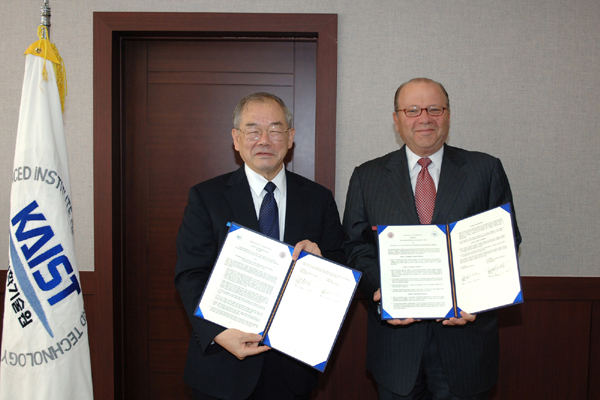 KAIST and Carnegie Mellon University establish a Dual Degree Program
Korea Advanced Institute of Science and Technology (KAIST) and Carnegie Mellon University make an agreement on collaboration in research and education, and a dual degree program.
KAIST and Carnegie Mellon make an agreement on ▲Exchange of Faculty Members ▲Exchange of Students ▲Dual Degree Program and ▲ Exploring cooperation in education and research. Presidents of both Universities had a signing ceremony at 11 A.M on Friday, Oct. 5th, 2007.
▲Lectures, joint research and exchange of faculty members ▲Undergraduate/graduate student exchange up to five students from one University each year ▲Dual degree program at the Ph. D. level ▲Opportunities for joint research projects and conferences will be explored according to the agreement between the two Universities.
KAIST and Carnegie Mellon have created a new dual degree program for Ph.D. students in civil and environmental engineering. Students admitted through the dual degree program are required to spend minimum 2 academic years in residence at each University. The total number of the student candidates participating in this program shall not exceed five in any given academic year initially. The students who met the graduation requirements shall be awarded two PhD degrees, one from KAIST and the other from Carnegie Mellon. All of its courses at KAIST are taught in English, which is the case starting in Fall 2007. Both Universities will explore the concept of sharing courses taught in English using videoconferencing technologies.
KAIST President Nam Pyo Suh said “We are delighted to have President Jared L. Cohon of Carnegie Mellon visit KAIST. I am looking forward to discussing various issues related to higher education and signing the Memorandum of Understanding between the two universities for student/faculty exchange programs, joint research, and the Carnegie Mellon- KAIST dual-degree program in civil and environment engineering. The dual degree program will initially begin in civil and environment engineering, and we hope to expand this to other areas in the future. Our goal is to generate future leaders who are able to lead global enterprises and conduct interdisciplinary research. This can be done through collaboration among leading scholars at Carnegie Mellon and KAIST. Our hope is that we can solve serious problems of the 21st century through the collaboration between our two institutions. I am especially excited to establish such a collaboration with Carnegie Mellon, my alma mater."
“Carnegie Mellon is well-suited to collaborate with KAIST. We believe this agreement will be a catalyst for future educational and research opportunities. I am especially pleased that this partnership is with an institution of KAIST"s stature” said Cohon.
About Carnegie Mellon:
Carnegie Mellon is a private research university with a distinctive mix of programs in engineering, computer science, robotics, business, public policy, fine arts and the humanities. More than 10,000 undergraduate and graduate students receive an education characterized by its focus on creating and implementing solutions for real problems, interdisciplinary collaboration, and innovation. A small student-to-faculty ratio provides an opportunity for close interaction between students and professors. While technology is pervasive on its 144-acre Pittsburgh campus, Carnegie Mellon is also distinctive among leading research universities for the world-renowned programs in its College of Fine Arts. A global university, Carnegie Mellon has campuses in Silicon Valley, Calif., and Qatar, and programs in Asia, Australia and Europe. For more, see www.cmu.edu ..
2007.10.09 View 19528
KAIST and Carnegie Mellon University establish a Dual Degree Program
Korea Advanced Institute of Science and Technology (KAIST) and Carnegie Mellon University make an agreement on collaboration in research and education, and a dual degree program.
KAIST and Carnegie Mellon make an agreement on ▲Exchange of Faculty Members ▲Exchange of Students ▲Dual Degree Program and ▲ Exploring cooperation in education and research. Presidents of both Universities had a signing ceremony at 11 A.M on Friday, Oct. 5th, 2007.
▲Lectures, joint research and exchange of faculty members ▲Undergraduate/graduate student exchange up to five students from one University each year ▲Dual degree program at the Ph. D. level ▲Opportunities for joint research projects and conferences will be explored according to the agreement between the two Universities.
KAIST and Carnegie Mellon have created a new dual degree program for Ph.D. students in civil and environmental engineering. Students admitted through the dual degree program are required to spend minimum 2 academic years in residence at each University. The total number of the student candidates participating in this program shall not exceed five in any given academic year initially. The students who met the graduation requirements shall be awarded two PhD degrees, one from KAIST and the other from Carnegie Mellon. All of its courses at KAIST are taught in English, which is the case starting in Fall 2007. Both Universities will explore the concept of sharing courses taught in English using videoconferencing technologies.
KAIST President Nam Pyo Suh said “We are delighted to have President Jared L. Cohon of Carnegie Mellon visit KAIST. I am looking forward to discussing various issues related to higher education and signing the Memorandum of Understanding between the two universities for student/faculty exchange programs, joint research, and the Carnegie Mellon- KAIST dual-degree program in civil and environment engineering. The dual degree program will initially begin in civil and environment engineering, and we hope to expand this to other areas in the future. Our goal is to generate future leaders who are able to lead global enterprises and conduct interdisciplinary research. This can be done through collaboration among leading scholars at Carnegie Mellon and KAIST. Our hope is that we can solve serious problems of the 21st century through the collaboration between our two institutions. I am especially excited to establish such a collaboration with Carnegie Mellon, my alma mater."
“Carnegie Mellon is well-suited to collaborate with KAIST. We believe this agreement will be a catalyst for future educational and research opportunities. I am especially pleased that this partnership is with an institution of KAIST"s stature” said Cohon.
About Carnegie Mellon:
Carnegie Mellon is a private research university with a distinctive mix of programs in engineering, computer science, robotics, business, public policy, fine arts and the humanities. More than 10,000 undergraduate and graduate students receive an education characterized by its focus on creating and implementing solutions for real problems, interdisciplinary collaboration, and innovation. A small student-to-faculty ratio provides an opportunity for close interaction between students and professors. While technology is pervasive on its 144-acre Pittsburgh campus, Carnegie Mellon is also distinctive among leading research universities for the world-renowned programs in its College of Fine Arts. A global university, Carnegie Mellon has campuses in Silicon Valley, Calif., and Qatar, and programs in Asia, Australia and Europe. For more, see www.cmu.edu ..
2007.10.09 View 19528 -
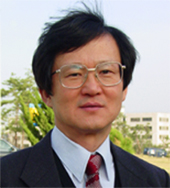 Prof. Lee Plants Commemorative Flower at NUAA
Prof. Lee Plants Commemorative Flower at NUAA
Professor In Lee of Aerospace Engineering planted a commemorative flower - Hibiscus, the national flora of South Korea - at Nanjing University of Aeronautics and Astronautics (NUAA) on May 25, 2007. While some Chinese Nobel laureates have planted commemorative trees, Professor Lee is the first foreigner who has planted a commemorative flower at NUAA. His planting is expected to contribute to opening academic and research exchanges between South Korea and China.
NUAA is the top university of China in the field of Aerospace Engineering and a technical university consisting of 2,800 faculty and staff and 26,000 students.
NUAA has colleges of Aerospace Engineering, Science, Engineering, Management, Art, Humanity, Foreign Language, and International Education and actively promotes international academic and research exchanges and international student program.
2007.06.12 View 13422
Prof. Lee Plants Commemorative Flower at NUAA
Prof. Lee Plants Commemorative Flower at NUAA
Professor In Lee of Aerospace Engineering planted a commemorative flower - Hibiscus, the national flora of South Korea - at Nanjing University of Aeronautics and Astronautics (NUAA) on May 25, 2007. While some Chinese Nobel laureates have planted commemorative trees, Professor Lee is the first foreigner who has planted a commemorative flower at NUAA. His planting is expected to contribute to opening academic and research exchanges between South Korea and China.
NUAA is the top university of China in the field of Aerospace Engineering and a technical university consisting of 2,800 faculty and staff and 26,000 students.
NUAA has colleges of Aerospace Engineering, Science, Engineering, Management, Art, Humanity, Foreign Language, and International Education and actively promotes international academic and research exchanges and international student program.
2007.06.12 View 13422 -
 KAIST To Open Cultural Activity Classes
KAIST To Open Cultural Activity Classes
KAIST will open classes of Cultural Activity (CA) this fall semester, and many of them will be instructed by students.
CA classes are regular classes opened to create a better atmosphere on campus and broaden students’ sociality and provide opportunities of diverse experiences to enhance students’ qualities as elite scientists. All classes will be provided at night or weekend to allow students to take part in cultural activities of their interests.
Total 21 classes, such as animation, photo-taking, electronic guitar, classic guitar, Ocarina, Inline skate, Haedong kendo, weight training, yoga, Tae-keuk-kwon, aerobic, recreation, hacking, drum playing, etc., will be provided, and 15 of them, such as animation, photo-taking, electronic guitar, etc., will be lectured by students. The students-lectured classes have been selected after thorough examination of lecture plans.
Leadership Mileage Points (LMP) will be offered to students both of lecturing and attending CA classes and, in the case of freshmen, a credit will be admitted for the obligatory subject of leadership demanding two credits. A larger number of students than the enrollment capacity have applied for the classes within a day. CA classes are expected to change campus life in KAIST.
Meanwhile, students will be given LMPs for each of their activities, such as humanity/ leadership lectures, on-campus voluntary services, off-campus voluntary services, mind and body training, exchange student activity, field experiences, etc., and will be issued a leadership certificate graded as ‘silver’, ‘gold’, ‘platinum’ and ‘diamond’ according to the accumulative LMPs in graduation. A personal certificate describing the details of on-campus activities by students will also be issued to help students’ employment activities.
KAIST has recently introduced a new two-dimensional admission policy that evaluates applicants’ humanities as well as academic achievements, based on President Suh’s judgment that students with expertise but no humanity will not be able to create the bright future of Korea. The LMP has the same purport as the new policy in that enrolled students are also to be evaluated in two aspects - humanity and academic achievements, and will bring a new paradigm to Korean education.
2007.06.08 View 12840
KAIST To Open Cultural Activity Classes
KAIST To Open Cultural Activity Classes
KAIST will open classes of Cultural Activity (CA) this fall semester, and many of them will be instructed by students.
CA classes are regular classes opened to create a better atmosphere on campus and broaden students’ sociality and provide opportunities of diverse experiences to enhance students’ qualities as elite scientists. All classes will be provided at night or weekend to allow students to take part in cultural activities of their interests.
Total 21 classes, such as animation, photo-taking, electronic guitar, classic guitar, Ocarina, Inline skate, Haedong kendo, weight training, yoga, Tae-keuk-kwon, aerobic, recreation, hacking, drum playing, etc., will be provided, and 15 of them, such as animation, photo-taking, electronic guitar, etc., will be lectured by students. The students-lectured classes have been selected after thorough examination of lecture plans.
Leadership Mileage Points (LMP) will be offered to students both of lecturing and attending CA classes and, in the case of freshmen, a credit will be admitted for the obligatory subject of leadership demanding two credits. A larger number of students than the enrollment capacity have applied for the classes within a day. CA classes are expected to change campus life in KAIST.
Meanwhile, students will be given LMPs for each of their activities, such as humanity/ leadership lectures, on-campus voluntary services, off-campus voluntary services, mind and body training, exchange student activity, field experiences, etc., and will be issued a leadership certificate graded as ‘silver’, ‘gold’, ‘platinum’ and ‘diamond’ according to the accumulative LMPs in graduation. A personal certificate describing the details of on-campus activities by students will also be issued to help students’ employment activities.
KAIST has recently introduced a new two-dimensional admission policy that evaluates applicants’ humanities as well as academic achievements, based on President Suh’s judgment that students with expertise but no humanity will not be able to create the bright future of Korea. The LMP has the same purport as the new policy in that enrolled students are also to be evaluated in two aspects - humanity and academic achievements, and will bring a new paradigm to Korean education.
2007.06.08 View 12840 -
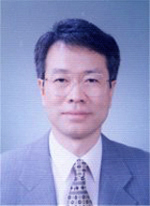 Prof. Hwang Inaugurated as 22nd President of KISS
Prof. Hwang Inaugurated as 22nd President of KISS
Kyu-Young Hwang, a professor of Computer Sciences, has been inaugurated as the 22nd president of the Korea Information Science Society (KISS). The KISS, established in 1973, is Korea’s largest computer science-related society holding about 4,000 members.
Prof. Hwang is now managing programs to issue the society’s publications and for information exchanges and putting huge efforts on promoting global cooperation and strengthening the partnership with overseas institutions to raise the society’s global standings. He is also making great efforts to enhance the capabilities and competitiveness of future human resources through a program to improve education systems concerning computer/ programming.
2007.04.30 View 13213
Prof. Hwang Inaugurated as 22nd President of KISS
Prof. Hwang Inaugurated as 22nd President of KISS
Kyu-Young Hwang, a professor of Computer Sciences, has been inaugurated as the 22nd president of the Korea Information Science Society (KISS). The KISS, established in 1973, is Korea’s largest computer science-related society holding about 4,000 members.
Prof. Hwang is now managing programs to issue the society’s publications and for information exchanges and putting huge efforts on promoting global cooperation and strengthening the partnership with overseas institutions to raise the society’s global standings. He is also making great efforts to enhance the capabilities and competitiveness of future human resources through a program to improve education systems concerning computer/ programming.
2007.04.30 View 13213 -
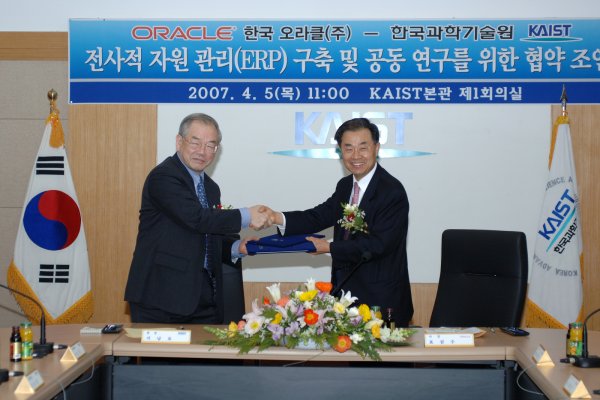 KAIST-Oracle Korea agrees on industry-academy cooperation
- To establish ERP systems throughout the entire fields of KAIST to provide advanced education and research services
- To perform Joint R&D in the field of ubiquitous- Agreement signed at KAIST on April 5
KAIST (President Nam-Pyo Suh) and Oracle Korea (President Sam-Soo Pyo) signed an agreement on the industry-academy cooperation program for the establishment and joint researches of advanced education services system on April 5 at 11 am.
KAIST and Oracle Korea will establish an Enterprise Resource Planning (ERP) system ‘ORACLE People Soft (PSFT) Campus Solution’ at KAIST. ‘PSFT Campus Solution’ refers to a university-oriented ERP system dominating world market share and will be introduced to KAIST for the first time among Korean universities. The establishment of ERP system and next-generation web services throughout KAIST will enhance KAIST’s management abilities over education and research, thereby making possible the offering of advanced education services. The both also agreed to promote joint researches in the field of ubiquitous.
Major cooperation items are ▲ the establishment and operation of ERP systems, ▲ the creation of advanced education services model for universities in Korea and East Asia and the setting-up of foundation for standard information services, ▲ the exploration of and participation in joint concerns, ▲ the establishment of joint information association for the exchanges of science and technology information, ▲ joint researches and development projects by the both parties, and ▲ education and training for the advancement of education institutes.
“The cooperation with world-class IT corporate Oracle can produce significant fruits of human power fostering and technology development in advanced fields,” KAIST President Nam-Pyo Suh said.
“The industry-academy cooperation by Oracle having a variety of world’s top IT technologies and KAIST will be a stepping stone for the advancement of domestic education institutes. I’ll devote myself to developing the models of state-of-the-art universities in the 21st century via close mutual cooperation,” said Sam-Soo Pyo, President of Oracle Korea.
2007.04.12 View 17576
KAIST-Oracle Korea agrees on industry-academy cooperation
- To establish ERP systems throughout the entire fields of KAIST to provide advanced education and research services
- To perform Joint R&D in the field of ubiquitous- Agreement signed at KAIST on April 5
KAIST (President Nam-Pyo Suh) and Oracle Korea (President Sam-Soo Pyo) signed an agreement on the industry-academy cooperation program for the establishment and joint researches of advanced education services system on April 5 at 11 am.
KAIST and Oracle Korea will establish an Enterprise Resource Planning (ERP) system ‘ORACLE People Soft (PSFT) Campus Solution’ at KAIST. ‘PSFT Campus Solution’ refers to a university-oriented ERP system dominating world market share and will be introduced to KAIST for the first time among Korean universities. The establishment of ERP system and next-generation web services throughout KAIST will enhance KAIST’s management abilities over education and research, thereby making possible the offering of advanced education services. The both also agreed to promote joint researches in the field of ubiquitous.
Major cooperation items are ▲ the establishment and operation of ERP systems, ▲ the creation of advanced education services model for universities in Korea and East Asia and the setting-up of foundation for standard information services, ▲ the exploration of and participation in joint concerns, ▲ the establishment of joint information association for the exchanges of science and technology information, ▲ joint researches and development projects by the both parties, and ▲ education and training for the advancement of education institutes.
“The cooperation with world-class IT corporate Oracle can produce significant fruits of human power fostering and technology development in advanced fields,” KAIST President Nam-Pyo Suh said.
“The industry-academy cooperation by Oracle having a variety of world’s top IT technologies and KAIST will be a stepping stone for the advancement of domestic education institutes. I’ll devote myself to developing the models of state-of-the-art universities in the 21st century via close mutual cooperation,” said Sam-Soo Pyo, President of Oracle Korea.
2007.04.12 View 17576 -
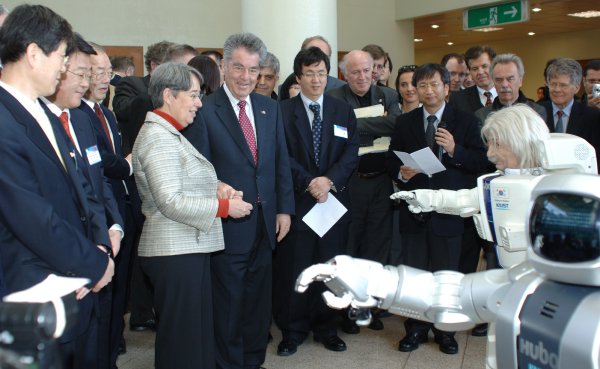 Austrian president and first lady visit KAIST
Austrian President Heinz Fischer and first lady Margit Fischer visited KAIST on April 4.
HUBO and Albert HUBO, humanoid robots of KAIST, welcomed Mr. and Mrs. President from Austria by giving bouquets to and shaking hands with them. HUBO also showed self-introduction, facial expression, and Tae-Geuk-Kwon demonstration.
KAIST President Nam-Pyo Suh said at his welcoming remarks, “KAIST has talented young people as its students, and over 32,000 KAIST graduates are playing very important roles at large conglomerates and schools. To become a world-class university, KAIST is promoting active global exchange programs and hopes to have joint programs with Austrian universities such as the Technical University of Vienna, etc.”
Austrian President Heinz Fischer said at his reply, “I am deeply impressed with KAIST, the final place visited during my trip to Korea. Albert HUBO evidently gave me a tip concerning the high technical power of KAIST. Austria is now on a strong education innovation program, and I hope to establish a long-term cooperation programs with distinguished Korean universities like KAIST.”
After the ceremony, Mr. and Mrs. President from Austria, Mr. and Mrs. President of KAIST, and distinguished guests had a 30-minute long luncheon at the grand seminar room.
2007.04.12 View 13409
Austrian president and first lady visit KAIST
Austrian President Heinz Fischer and first lady Margit Fischer visited KAIST on April 4.
HUBO and Albert HUBO, humanoid robots of KAIST, welcomed Mr. and Mrs. President from Austria by giving bouquets to and shaking hands with them. HUBO also showed self-introduction, facial expression, and Tae-Geuk-Kwon demonstration.
KAIST President Nam-Pyo Suh said at his welcoming remarks, “KAIST has talented young people as its students, and over 32,000 KAIST graduates are playing very important roles at large conglomerates and schools. To become a world-class university, KAIST is promoting active global exchange programs and hopes to have joint programs with Austrian universities such as the Technical University of Vienna, etc.”
Austrian President Heinz Fischer said at his reply, “I am deeply impressed with KAIST, the final place visited during my trip to Korea. Albert HUBO evidently gave me a tip concerning the high technical power of KAIST. Austria is now on a strong education innovation program, and I hope to establish a long-term cooperation programs with distinguished Korean universities like KAIST.”
After the ceremony, Mr. and Mrs. President from Austria, Mr. and Mrs. President of KAIST, and distinguished guests had a 30-minute long luncheon at the grand seminar room.
2007.04.12 View 13409 -
 Dual Degree Programs with TU Berlin
Dual Degree Programs with TU Berlin- Five students to be exchanged each year from this year, receive degrees from both schools- Final stage of negotiation with GIT, UCSB- On-going DDP negotiations with Delft University of Technology in Netherlands, Royal Institute of Technology in Sweden, Technical University of Denmark, Norwegian University of Science and Technology, Tsinghua University in China, Tokyo Institute of Technology- DDPs with Ecole Polytechnique, INSA Lyon of France, and University of Karlsruhe of Germany underway at department levels
KAIST (President Nam-Pyo Suh) will begin Dual Degree Programs (DDP) with Technical University of Berlin (TU Berlin).
The both recently reached an accord on the implementation of DDP and will exchange maximum five students each year, starting this year. The DDP allows each school involved to exchange students who meet the counterpart’s requirements one-by-one with prior consensus of departments to accept the students and to confer its own diplomas on students who complete the prescribed graduation requirements.
TU Berlin, established in 1770, currently holds 28,344 enrolled students, among which 5,829 students are from abroad (over 20%) and provides lectures for more than 50 subjects in the fields of Humanities, Social Sciences, Economics and so on with its emphases on Natural Science and Engineering. TU Berlin has fostered a multitude of distinguished scientists, including 1986 Nobel Prize Recipient in Physics Ernst Ruska who developed an electronic microscope for the first time in the world.
KAIST has now been eagerly promoting the DDPs with many distinguished foreign universities. It is on the final stage of the DDP negotiation with Georgia Institute of Technology (GIT) and University of California Santa Barbara (UCSB), and has already agreed with Tsinghua University in China to implement the DDPs in several advanced fields. Also, an agreement with Tokyo Institute of Technology (TIT) is soon to be made.
With Ecole Polytechnique and INSA Lyon of France, and University of Karlsruhe of Germany, the negotiation is underway at department levels, and the DDPs are also being promoted with Milan Technical University of Italy, Delft University of Technology of Netherlands, Royal Institute of Technology (KTH) of Sweden, Technical University of Denmark (DTU), Norwegian University of Science and Technology (NUNT).
“As global interests in East Asia arise, interests in KAIST by many foreign universities also increase. We are planning to expand the scope of this program to provide KAIST students with more opportunities of studying abroad and to attract more outstanding foreign students,” KAIST Dean of Academic Affairs Kwang-Hyung Lee explained.
- Dual Degree Program (DDP)In DDP, schools involved can maintain their own curriculums and confer their own degrees on students who complete the graduation requirements. Therefore, students can receive degrees from both schools involved. Meanwhile, DDP is not the same concept with Joint Degree Program (JDP), in which schools involved establish a joint curriculum and confer a single joint degree on students.
2007.03.19 View 21204
Dual Degree Programs with TU Berlin
Dual Degree Programs with TU Berlin- Five students to be exchanged each year from this year, receive degrees from both schools- Final stage of negotiation with GIT, UCSB- On-going DDP negotiations with Delft University of Technology in Netherlands, Royal Institute of Technology in Sweden, Technical University of Denmark, Norwegian University of Science and Technology, Tsinghua University in China, Tokyo Institute of Technology- DDPs with Ecole Polytechnique, INSA Lyon of France, and University of Karlsruhe of Germany underway at department levels
KAIST (President Nam-Pyo Suh) will begin Dual Degree Programs (DDP) with Technical University of Berlin (TU Berlin).
The both recently reached an accord on the implementation of DDP and will exchange maximum five students each year, starting this year. The DDP allows each school involved to exchange students who meet the counterpart’s requirements one-by-one with prior consensus of departments to accept the students and to confer its own diplomas on students who complete the prescribed graduation requirements.
TU Berlin, established in 1770, currently holds 28,344 enrolled students, among which 5,829 students are from abroad (over 20%) and provides lectures for more than 50 subjects in the fields of Humanities, Social Sciences, Economics and so on with its emphases on Natural Science and Engineering. TU Berlin has fostered a multitude of distinguished scientists, including 1986 Nobel Prize Recipient in Physics Ernst Ruska who developed an electronic microscope for the first time in the world.
KAIST has now been eagerly promoting the DDPs with many distinguished foreign universities. It is on the final stage of the DDP negotiation with Georgia Institute of Technology (GIT) and University of California Santa Barbara (UCSB), and has already agreed with Tsinghua University in China to implement the DDPs in several advanced fields. Also, an agreement with Tokyo Institute of Technology (TIT) is soon to be made.
With Ecole Polytechnique and INSA Lyon of France, and University of Karlsruhe of Germany, the negotiation is underway at department levels, and the DDPs are also being promoted with Milan Technical University of Italy, Delft University of Technology of Netherlands, Royal Institute of Technology (KTH) of Sweden, Technical University of Denmark (DTU), Norwegian University of Science and Technology (NUNT).
“As global interests in East Asia arise, interests in KAIST by many foreign universities also increase. We are planning to expand the scope of this program to provide KAIST students with more opportunities of studying abroad and to attract more outstanding foreign students,” KAIST Dean of Academic Affairs Kwang-Hyung Lee explained.
- Dual Degree Program (DDP)In DDP, schools involved can maintain their own curriculums and confer their own degrees on students who complete the graduation requirements. Therefore, students can receive degrees from both schools involved. Meanwhile, DDP is not the same concept with Joint Degree Program (JDP), in which schools involved establish a joint curriculum and confer a single joint degree on students.
2007.03.19 View 21204 -
 Professor Sang-Yup Lee Senior Editor of U.S. Biotechnology Journal
Professor Sang-Yup Lee Named Senior Editor of U.S. Biotechnology Journal
Will supervise paper examination in the fields of system biology, system bioengineering and
metabolic engineering, and set editing direction
Professor Sang-Yup Lee, LG Chemical’s Chair-Professor and the leader of BK project group of KAIST Chemical and Biomolecular Engineering Department, was named senior editor of Biotechnology Journal published by the U.S. Wiley-VCH.
Professor Lee will supervise paper examination in the fields of system biology, system bioengineering and metabolic engineering, and set and manage the editing direction of the journal.
‘Biotechnology Journal’ was first published in January 2006 to exchange rapidly-exchanging knowledge and information in life science and its relevant fields by Wiley, a world-famous science journal publisher with the history of 208 years (founded in 1799). Particularly, ‘Biotechnology Journal’ is a new-typed scientific journal treating various fields such as life science research-relevant ethics and cultures necessary for general people as well as expertise research information of life science.
“Although taking charge of editing of many scientific journals spends much time, it’s very fruitful that I’ll lead the direction of research papers of many world-famous scientific journals and I can make efforts to prevent outstanding papers by Korean scientists from being disadvantaged,” said Professor Lee.
“More Korean scholars are taking charge of editing jobs of world-famous scientific journals. It’s a good indication that the capacities of Korean science and engineering have been enhanced significantly as much,” a staff of KAIST PR team said.
Meanwhile, Professor Lee, distinguished by outstanding research performances in the fields of metabolic engineering and system life engineering, is now ▲associate editor of Biotechnology and Bioengineering, top scientific journal of biotech engineering published by the U.S. Wiley ▲editor of Applied Microbiology and Biotechnology published by German Springer ▲ associate editor of Bioprocess and Biosystems Engineering by German Springer, and editing member of ▲ Journal of Bioinformatics and Computational Biology by Singapore’s World Scientific ▲ Asia Pacific Biotech News ▲ Biochemical Engineering Journal, Metabolic Engineering, and Microbial Cell Factory by Elsevier.
2007.02.02 View 16361
Professor Sang-Yup Lee Senior Editor of U.S. Biotechnology Journal
Professor Sang-Yup Lee Named Senior Editor of U.S. Biotechnology Journal
Will supervise paper examination in the fields of system biology, system bioengineering and
metabolic engineering, and set editing direction
Professor Sang-Yup Lee, LG Chemical’s Chair-Professor and the leader of BK project group of KAIST Chemical and Biomolecular Engineering Department, was named senior editor of Biotechnology Journal published by the U.S. Wiley-VCH.
Professor Lee will supervise paper examination in the fields of system biology, system bioengineering and metabolic engineering, and set and manage the editing direction of the journal.
‘Biotechnology Journal’ was first published in January 2006 to exchange rapidly-exchanging knowledge and information in life science and its relevant fields by Wiley, a world-famous science journal publisher with the history of 208 years (founded in 1799). Particularly, ‘Biotechnology Journal’ is a new-typed scientific journal treating various fields such as life science research-relevant ethics and cultures necessary for general people as well as expertise research information of life science.
“Although taking charge of editing of many scientific journals spends much time, it’s very fruitful that I’ll lead the direction of research papers of many world-famous scientific journals and I can make efforts to prevent outstanding papers by Korean scientists from being disadvantaged,” said Professor Lee.
“More Korean scholars are taking charge of editing jobs of world-famous scientific journals. It’s a good indication that the capacities of Korean science and engineering have been enhanced significantly as much,” a staff of KAIST PR team said.
Meanwhile, Professor Lee, distinguished by outstanding research performances in the fields of metabolic engineering and system life engineering, is now ▲associate editor of Biotechnology and Bioengineering, top scientific journal of biotech engineering published by the U.S. Wiley ▲editor of Applied Microbiology and Biotechnology published by German Springer ▲ associate editor of Bioprocess and Biosystems Engineering by German Springer, and editing member of ▲ Journal of Bioinformatics and Computational Biology by Singapore’s World Scientific ▲ Asia Pacific Biotech News ▲ Biochemical Engineering Journal, Metabolic Engineering, and Microbial Cell Factory by Elsevier.
2007.02.02 View 16361 -
 Singer Janghoon Kim Donates Development Fund to KAIST
Singer Janghoon Kim Donates Development Fund to KAIST
- Generously donates part of earnings from his concert where HUBO performed for development of science
- Opportunity for activation of science culture through encounter between science and culture
Singer Janghoon Kim donated 50 million won from his concert earnings for KAIST development fund.
Singer Kim visited KAIST on January 16 (Tue) and donated the development fund at the joint lecture room in KAIST Mechanical Engineering B/D.
Singer Kim had a concert at the end of the last year where he performed with ‘HUBO’ and ‘Albert HUBO’, human-like robots of KAIST HUBO center.
Singer Kim made a donation to express his gratitude to KAIST Professor Joonho Oh and his research team, who assisted his concert actively to allow HUBO to join the concert in spite of technical difficulties and research obstacles.
“Although HUBO has performed various activities so far, it is the first time to make a successful performance with a singer on a stage. Honestly, I hesitated a lot to allow HUBO to join Kim’s concert due to safety problems etc., but I was so impressed by Kim’s interest and passion for science, and thus decided HUBO’s joining the concert. This is the first case how robots can exchange with public cultures. I wish this case will be a momentum to activate science culture and make people feel closer to science,” Professor Oh said.
The donation will be spent partly as KAIST development fund (20 million won) and partly on the publicity of science and technology via HUBO (30 million won).
2007.01.23 View 14785
Singer Janghoon Kim Donates Development Fund to KAIST
Singer Janghoon Kim Donates Development Fund to KAIST
- Generously donates part of earnings from his concert where HUBO performed for development of science
- Opportunity for activation of science culture through encounter between science and culture
Singer Janghoon Kim donated 50 million won from his concert earnings for KAIST development fund.
Singer Kim visited KAIST on January 16 (Tue) and donated the development fund at the joint lecture room in KAIST Mechanical Engineering B/D.
Singer Kim had a concert at the end of the last year where he performed with ‘HUBO’ and ‘Albert HUBO’, human-like robots of KAIST HUBO center.
Singer Kim made a donation to express his gratitude to KAIST Professor Joonho Oh and his research team, who assisted his concert actively to allow HUBO to join the concert in spite of technical difficulties and research obstacles.
“Although HUBO has performed various activities so far, it is the first time to make a successful performance with a singer on a stage. Honestly, I hesitated a lot to allow HUBO to join Kim’s concert due to safety problems etc., but I was so impressed by Kim’s interest and passion for science, and thus decided HUBO’s joining the concert. This is the first case how robots can exchange with public cultures. I wish this case will be a momentum to activate science culture and make people feel closer to science,” Professor Oh said.
The donation will be spent partly as KAIST development fund (20 million won) and partly on the publicity of science and technology via HUBO (30 million won).
2007.01.23 View 14785